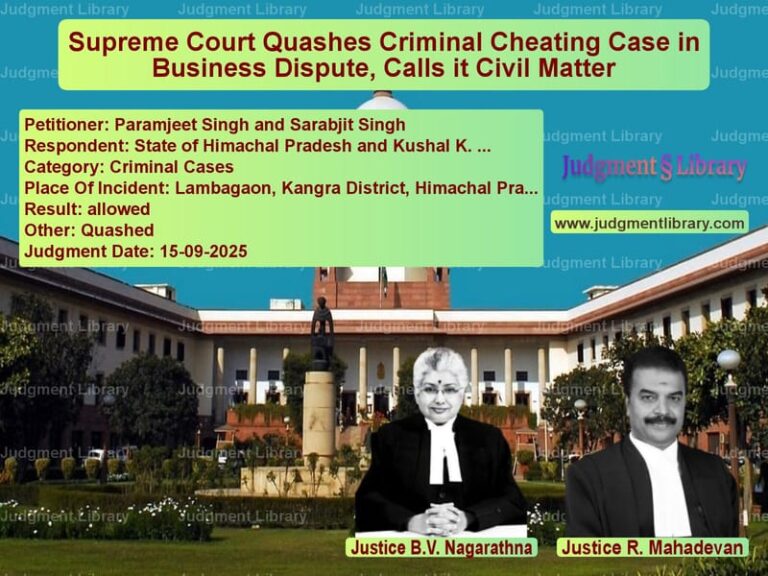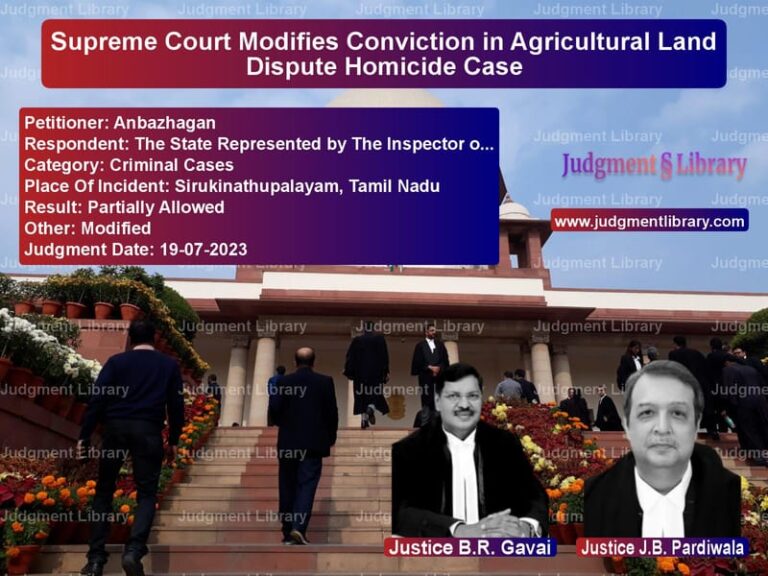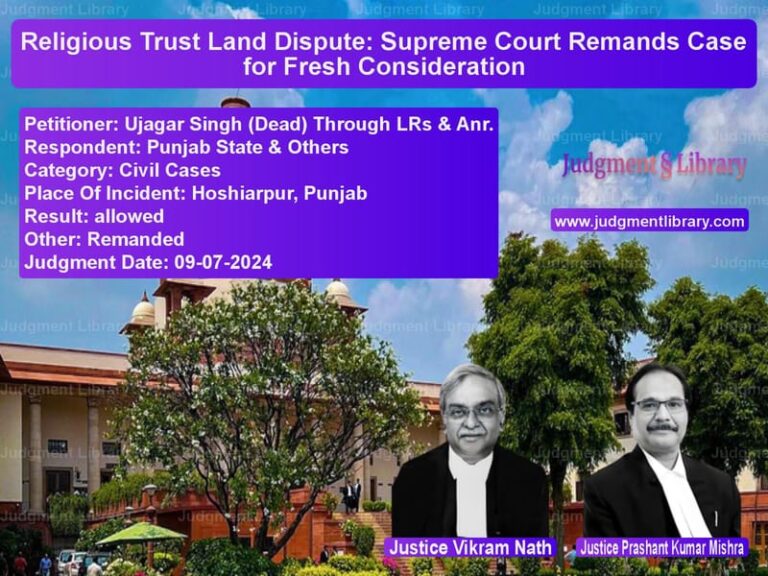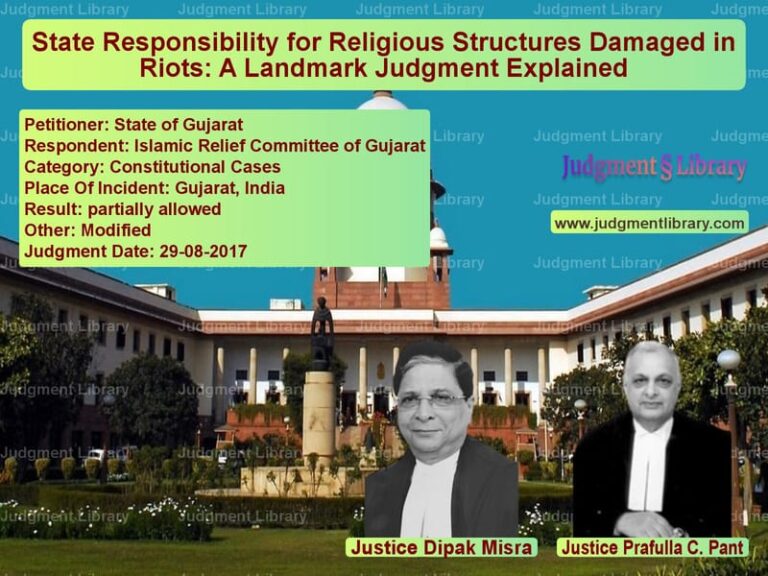Supreme Court Restores Pension Rights of Army Veteran Discharged on Medical Grounds
The case of Ex-Sepoy (Washerman) Ram Khilawan v. Union of India & Ors. revolved around the wrongful discharge of an army personnel on medical grounds and his entitlement to pension. The Supreme Court had to determine whether the appellant’s discharge was legally valid and if he was entitled to pension benefits under Army Rules.
The Court ruled in favor of the appellant, restoring his pension rights and holding that his discharge was illegal as it was not carried out following due procedure.
Background and Key Issues
The appellant was enrolled in the Army on October 23, 1987, as a Washerman. On August 31, 1993, he was discharged from service on medical grounds due to “CNS (IN) Seizure” after being placed in Low Medical Category BEE. He challenged the discharge before the Armed Forces Tribunal but was unsuccessful.
The key legal questions before the Supreme Court were:
- Was the appellant’s discharge valid under Army Rules?
- Did the Army follow the correct procedure before discharging him?
- Was the appellant entitled to pension benefits?
Arguments of the Petitioner (Ram Khilawan)
- The Army did not issue a show-cause notice before discharging him, violating Rule 13(3) of the Army Rules, 1954.
- Despite being found medically unfit, he was not referred to the Invalidating Medical Board before discharge.
- He had completed 5 years, 11 months, and 8 days of service, but Army Order 46/80 mandated that Low Medical Category personnel be retained for at least 10 years.
- The rejection of his pension claim was arbitrary, as he should have been deemed to have served for at least 10 years.
Arguments of the Respondents (Union of India & Ors.)
- The appellant was discharged under Rule 13(3) Item III(v) of the Army Rules.
- He was found medically unfit and no sheltered appointment was available for him.
- The discharge order was in line with Army Order 46/80.
- Since he did not complete 15 years of service, he was not entitled to pension benefits.
Supreme Court’s Key Observations
1. Discharge Without Referral to Medical Board is Illegal
“Since the discharge of the appellant was based on medical unfitness, it should have been done only on the recommendation of the Invalidating Medical Board. The failure to follow this procedure renders the discharge illegal.”
The Court held that the appellant was entitled to a fair evaluation by a Medical Board before being discharged.
2. Army Order 46/80 Mandates Retention for 10 Years
“Army Order 46/80 provides that a Low Medical Category personnel should be retained for at least 10 years in the case of Other Ranks. The appellant had served for nearly 6 years and should have been deemed to have completed 10 years of service.”
The Court found that the appellant’s service should have been extended until October 22, 1997.
3. Appellant Entitled to Pension
“Since the appellant should have been deemed to have completed 10 years of service, he is entitled to pension benefits. The rejection of his pension claim was unjustified.”
The Court ruled that the appellant was entitled to pension in addition to the disability pension he had received for five years.
4. No Arrears of Salary Due to ‘No Work No Pay’
“The appellant is not entitled to arrears of salary for the period up to his deemed discharge date as he did not perform any work during that period. However, he is entitled to arrears of pension.”
The Court clarified that the appellant would receive pension arrears but not salary arrears.
Final Judgment
The Supreme Court set aside the previous decisions and ruled that:
- The appellant’s discharge was illegal as it did not follow the required procedure.
- He should be deemed to have served for 10 years and is entitled to pension.
- He is not entitled to arrears of salary but will receive arrears of pension for three years prior to filing his case.
- The arrears of pension should be paid within six months.
Impact of the Judgment
- Ensures Due Process in Military Discharges: Mandates that medically unfit soldiers must be referred to a Medical Board before discharge.
- Protects Pension Rights of Soldiers: Reinforces the requirement of 10 years of service for pension eligibility.
- Prevents Arbitrary Discharges: Ensures that Army personnel are not wrongfully discharged without following due procedure.
- Upholds Welfare Principles for Army Personnel: Establishes that medically unfit soldiers should be retained when possible.
The Supreme Court’s decision safeguards the rights of army personnel discharged on medical grounds and ensures they receive due pension benefits.
Petitioner Name: Ex-Sepoy (Washerman) Ram Khilawan.Respondent Name: Union of India & Ors..Judgment By: Justice L. Nageswara Rao, Justice Hemant Gupta.Place Of Incident: India.Judgment Date: 02-09-2019.
Don’t miss out on the full details! Download the complete judgment in PDF format below and gain valuable insights instantly!
Download Judgment: Ex-Sepoy (Washerman) vs Union of India & Ors Supreme Court of India Judgment Dated 02-09-2019.pdf
Direct Downlaod Judgment: Direct downlaod this Judgment
See all petitions in Pension and Gratuity
See all petitions in Public Sector Employees
See all petitions in Judgment by L. Nageswara Rao
See all petitions in Judgment by Hemant Gupta
See all petitions in allowed
See all petitions in supreme court of India judgments September 2019
See all petitions in 2019 judgments
See all posts in Service Matters Category
See all allowed petitions in Service Matters Category
See all Dismissed petitions in Service Matters Category
See all partially allowed petitions in Service Matters Category







